Economic independence and vulnerability
This entry will help you find information about the history behind Auckland's economic progress and independence, and the factors that impacted it.
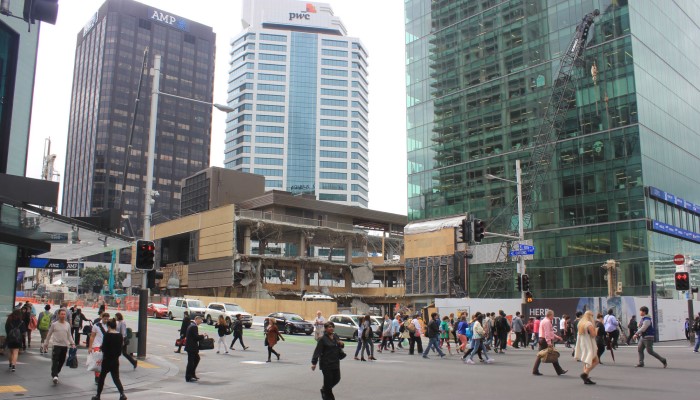
Images: Downtown Shopping Centre demolition, 2016 by Matt Elliot. Collection: Auckland Libraries Heritage Collections 1385-0312
Keywords
Here are some keywords based on historical events that went for and against the economy of Auckland as well as the Māori economy. Use this list when searching the collections and websites in this entry.
Great Depression: In 1929 stock prices fell in the United States. As a result, people lost a lot of money, companies closed down, and millions lost their jobs.
Deregulation (removal of rules): Between the 1980s and 1990s, the government removed rules and limits on road and transport networks.
El Jay: This New Zealand fashion label was started by Gus Fischer, a leading name in the fashion industry from the 1950s to the 1980s.
Freezing works: These were New Zealand's first large-scale industrial plants that began in the 1880s. Often built near wharves, the factories froze meats to be shipped to overseas markets.
Import and export: Over the years New Zealand developed trade exchange with countries like Australia and Britain. Meat, timber, wool and dairy were some of the first major exports.
Refrigeration: This helped frozen meat and dairy products to be shipped overseas.
Land for Settlements Act 1894: This law passed by Parliament allowed the government to acquire land when offered by landowners. Landowners could also be forced to sell their land if it was required by the government.
Manufacturing: Māori and early settlers made many goods for local use. They used plants, shells and stones to make clothes, houses and fishing nets. Early settlers made beer, bread and clothes as it was cheap and easy to make then.
Native Land Act 1865: This act passed by Parliament allowed land owned by hapū or iwi to be individually owned. This made more land available to be sold, and also easier for early settlers to purchase Māori land.
Oil crisis 1973: Arab oil producers cut oil supply due to the Arab-Israel war. This increased the price of petrol around the world including in New Zealand.
Primary industry (primary production): These are industries such as forestry, fisheries and mining that deal in obtaining natural materials like wood, minerals, and fish.
Protectionism: Laws passed by the government between 1938 to 1988 reduced the number of goods imported into the country. This protected New Zealand manufacturers like Zip, Speedee, and Crown Lynn and helped them expand and develop.
Public Works Land Act 1864: This act allowed land owned by Māori and Pākehā to be taken over by the government (sometimes without payment) for the construction of roads, railways and public works.
Trekka: New Zealand's first mass-produced motor vehicle was designed and manufactured locally in the 1960s. The vehicles were built by Motor Holding.
Vogel's scheme: This began in 1870 when Colonial Treasurer Julius Vogel planned to borrow large sums of money from the London money markets to speed up government-assisted migration and to build roads, railways, and other public works.
Tips: Before searching it can be useful to come up with a list of words to use. These are sometimes called keywords or search words. They can be the name of a person, place, or event you are researching. You can leave out small words like ‘the’ and ‘of’ and just choose the main ones, eg 'timber industry'. We can always change our keywords or add more if we need to.
Tips: Also keep in mind that there are different names or spellings for words. Or they could have changed over time.
Auckland resources
Here are some collections from Auckland Libraries and other reliable Auckland based museums and heritage websites. They will help you find books and information on the factors that helped build the economy of Auckland, including those that caused it to struggle.
Auckland Libraries Catalogue
This catalogue from Auckland Libraries will help find books on Aotearoa New Zealand and Auckland's histories.
Search the catalogue using keywords like ‘economic history Auckland’ or ‘export history of New Zealand’ or ‘House of El Jay’ or any of the keywords from the list above.
You can get fewer results by using the filters under Refine by.
Select a book that interests you.
Go down the page to Edition information to check if the book can be borrowed or if it’s for In library use only.
Look down the page to Related Resources to find other titles related to this search.
If you have an Auckland Libraries card, you can also request the item be sent to your local library.
Tips: You will find lots of books that have been written over 50 years ago. While they are good sources of information, we need to remember the context and time from when they were written.
Tips: If the status of the book is 'In library use only', it means the book can only be used in the library and can't be taken home. In this case, you will need to fill out a form or speak to a librarian about reading the book in the library.
Kura — Photographs
Browse photographs, illustrations and works of art from the 1800s to today.
Try the search words ‘Westfield freezing’ to find the image Auckland Municipal Abattoir, 1920s.
Then try ‘forestry’ to find an image of a Logging train at Helensville, 2008.
Tips: Always remember to check the copyright or usage rights of images. This will tell you if you need permission to use the image, and how to attribute the image.
Heritage et AL
The Heritage et AL blog is written by librarians and is a useful way to find information about Auckland Libraries' heritage collections.
Enter the keywords 'agriculture' and look for Government gardens in South Auckland.
This story from the 1940s is about the use of land in Franklin District to grow vegetables.
The search word 'shopping' brings up some interesting stories about the growth of shopping areas in Auckland.
Read Auckland’s 1960s American-style shopping malls and Lower Queen Street about the increase in retail in Auckland.
Tips: Blogs can be good for looking at how things have continued or changed over time. Remember, stories can be told in different ways so it’s helpful to look at multiple information sources to find different perspectives.
Kura — Oral History
Find collections of oral history interviews, collection series, recorded talks and events.
Use the search word 'manufacturing' in the search box at the top of the page.
Look for Brian Potter, talk on Chelsea Sugar Works, 2018.
Go down the page to Listen to the Interview.
Listen to the story about the setting up of Chelsea Sugar Works in Birkenhead, its impact on the local area, employment and the attraction of new settlers.
Not all of the oral histories are available online, so fill up the form that comes with the oral history item you want to listen to or watch, then select Submit form. The library will get in touch with you when they have the item ready for you to use.
Tips: Primary sources like oral histories are useful for hearing first-hand accounts, and gathering information about people’s values, attitudes and experiences about a topic or event from that time. Keep in mind that they may not fairly show a wide range of views or experiences.
Kura — Local History
This collection for researching local and family history has some stories on how transport developed Auckland.
Try the word 'transport' in the search box.
The story covers the beginning of Auckland's first railway network, the transport of passengers and produce, and the impact of the Vogel scheme on the development of public works.
Tips: Make sure to read the 'Usage Rights' or check with Auckland Libraries for the use of these items as copyright rules may apply.
Tāmaki Paenga Hira | Auckland War Memorial Museum
This is one of New Zealand's significant heritage libraries. It has pictorial and art, Māori and Pacific, natural, social, and history collections. It is a great place to visit and check out exhibitions and galleries about topics involving Aotearoa New Zealand's histories.
Use the keywords 'Native Land Act', then select the tab called Stories.
The story Timeline — Māori has information on early trade, land confiscation, ownership of Auckland and land marches.
Tips: Websites that have .com or .co in the address can have good information, but you need to assess how reliable it is. Check the About us link on the website, if you can find one. That can tell you what the company’s mission and values are.
MOTAT (Museum of Transport and Technology)
Based in Auckland, this is New Zealand’s largest transport and technology museum. Visitors can explore and discover the achievements that have helped shape New Zealand’s history.
Go to the tab Collections & Stories, then select Stories.
Read The Trekka: A Utility Vehicle for the New Zealand Market.
The article is about the development of Trekka and the secret to its success.
Use Stories to discover other important technology related to Aotearoa.
Use Collections Online to find collections of images or stories on the history of transport and technology in Aotearoa.
Tips: Some websites have .au, .nz, .uk or other codes in their url. This can tell you which country this website comes from eg .au is from Australia or .nz is from New Zealand. You can check the ‘About Us’ link on the website for more information.
New Zealand Maritime Museum
The museum has one of New Zealand’s most important collections, archives and stories of its people and the sea. This includes Pacific migration stories, New Zealand’s maritime history and modern technology and design.
From the tab Collections, select Stories and Blogs.
Look down the page to Maritime Arts and Culture to find Percy Vos: A History of Auckland's Oldest Surviving Wooden Boat Shed and Slipway.
The story covers Percy Vos's boatbuilding industry in Tāmaki Makaurau.
Tips: A visit to a museum is a great way to learn about the history and culture of a country. Use the tabs at the top of the page to check out the exhibitions they have on, or any upcoming events.
General New Zealand resources
The websites below belong to government agencies, national museums, archives, libraries and other reliable sources. They will help you understand the rapid growth of Auckland, its economy and the challenges faced.
Te Ara: The Encyclopedia of New Zealand
Te Ara is an excellent starting point for all questions about Aotearoa New Zealand. If we look down to the bottom of the page, we can see that the website belongs to the Ministry for Culture & Heritage, so the information is well-researched and reliable.
Go to the Sitemap, then explore the section Economy and the City to read about the benefits of manufacturing, retail, transport, farming, industrialisation, and market liberalisation.
This section also covers overseas trade policy that includes the impacts of the Great Depression, the world wars, and the European Economic Community (EEC).
Also, go to Stories A-Z to find out about the Auckland region, its timber towns from the 1870s, farming and city building and expansion.
NZ History
NZ History is another great website for information about Aotearoa New Zealand. The website belongs to the Ministry for Culture & Heritage, so the information is well-researched and reliable.
Use the section on Politics and Government to find The work of government in assisted immigration, The Vogel era and state housing.
Tips: We like sites like this because they’re reliable. You can tell because of their web address – they have either .govt or .ac, meaning they are from government or educational organisations. They’re also New Zealand sites, so relevant for us.
Ngā Taonga Sound & Vision
Ngā Taonga Sound & Vision is New Zealand’s audio-visual archive. Their collection includes film and television, radio and sound recordings, props, posters and more from over 120 years of New Zealand’s history.
Use the search words 'Auckland industry'.
Select the filter option for View or listen online now to find Industrial New Zealand - Penrose.
The video is about the growth of exports that led to industrial areas such as Penrose in Auckland.
The search words 'Great Depression' will link to the audio The Days of the sugar bag — the great depression of the hungry thirties.
Listen to a documentary about unemployment, soup kitchens and riots in Auckland and Wellington in the 1930s.
Tips: Make sure to select 'View or listen online now' after each search as not all items can be viewed or listened to online on Ngā Taonga Sound & Vision.
NZ On Screen
NZ On Screen is a collection of television, film, music videos and web series from the past to today. It is managed by the Digital Media Trust and funded by New Zealand On Air.
Search for the documentary series called Making New Zealand.
The series covers the development and struggles of the farming, forestry, manufacturing, mining and shipping industry in Aotearoa.
WW 100
WW 110 was a New Zealand government initiative to remember New Zealand's participation in World War One. It has information on activities, state ceremonies and memories of how the war impacted people and the nation.
Go to the tab NZ at War, then look down the column on the left to select Then & Now.
Read the story Death and Taxes about the impacts of World War One on New Zealand's economy.
Tips: We like sites like this because they’re reliable. You can tell because of their web address – they have either .govt or .ac, meaning they are from government or educational organisations. They’re also New Zealand sites, so relevant for us.
Books
You can also visit your local public library for books on Auckland and Aotearoa New Zealand histories. Listed below are a few titles to help you with your search for books on this topic:
Paradise reforged: a history of New Zealanders from the 1880s to the year 2000 by James Belich
Not in narrow seas: the economic history of Aotearoa New Zealand by B H Easton
Emerging from an entrenched colonial economy: New Zealand primary production, Britain and the EEC, 1945-1975 by David Hall
From the rising sun to the long white cloud: the history of used car importing to New Zealand by Jackie Russell
A short history of farming in New Zealand by Gordon McLauchlan
SCIS no: 5496690
More about Auckland
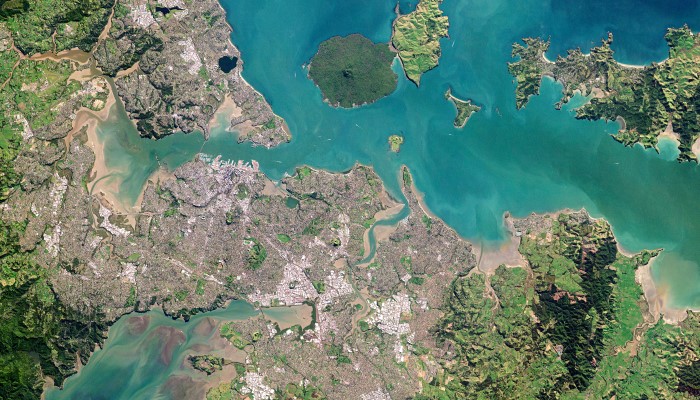
Local iwi
There are many iwi with ancestral relationships to Tāmaki Makaurau. This page lists iwi and websites which have information about their histories.
Learn about local iwi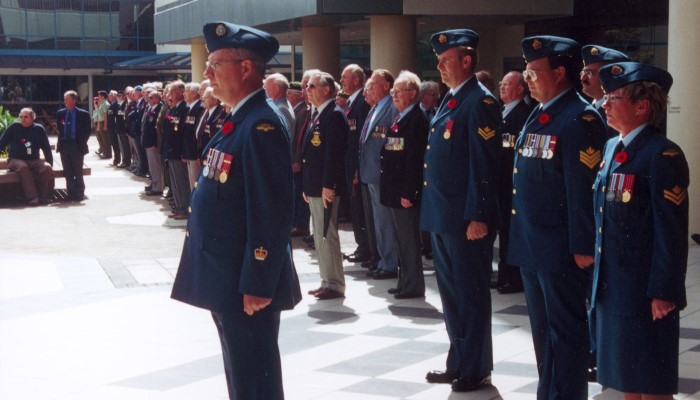
Changing views on conflict
This entry recommends resources to find out how New Zealand's involvement and views of conflict have changed over time, and how wars are commemorated. It also looks at New Zealand's work with the United Nations and current ideas of national identity.
Learn about changing views on conflict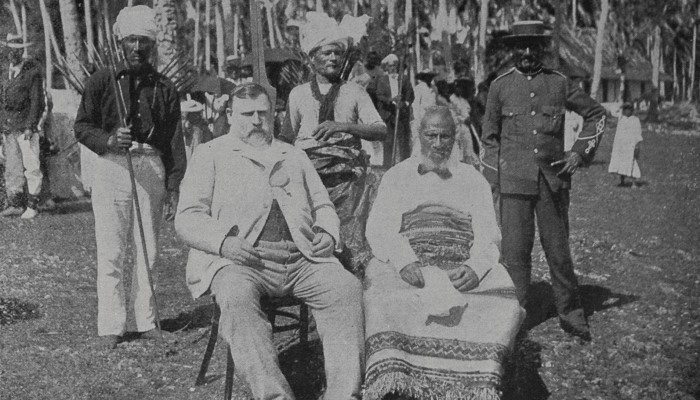
Colonial power in the Pacific
This entry has collections and websites to help explore the history of New Zealand's presence and colonial power in the Pacific. It has examples of the rise of independent Pacific nations and how they sustained their culture and presence in the Pacific.
Learn about colonial power in the Pacific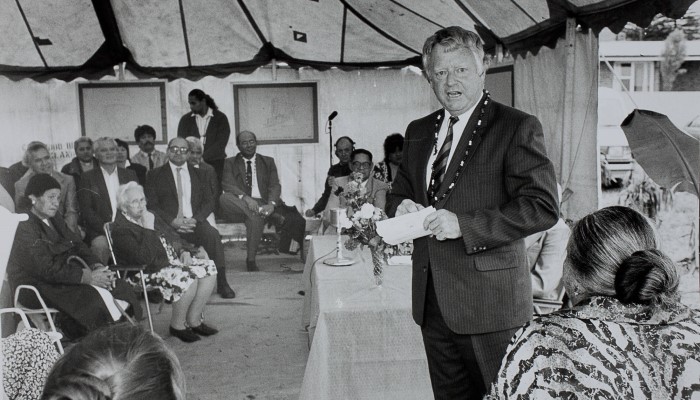
Decolonising the Pacific
This entry will help you find the best websites and collections to explore the decolonisation of the Pacific, including Aotearoa New Zealand's continued interests in the region.
Learn about decolonising the Pacific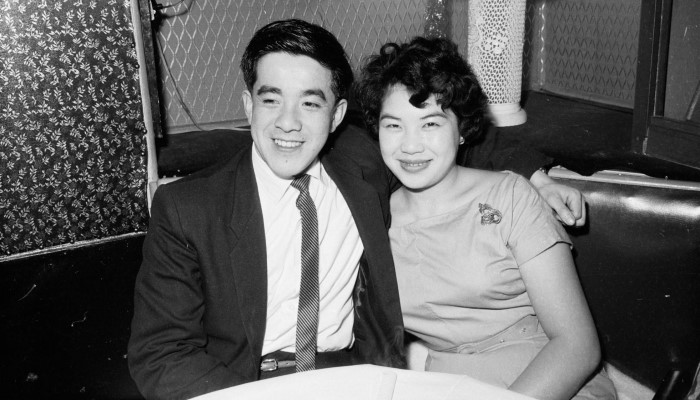
Finding a place in Aotearoa New Zealand
Since the 1700s, new people have immigrated to Aotearoa. Some came in search of a better way of life or because their country was no longer safe. Newcomers could experience racism and discrimination. They also helped shape New Zealand as a country.
Learn about finding a place in Aotearoa New Zealand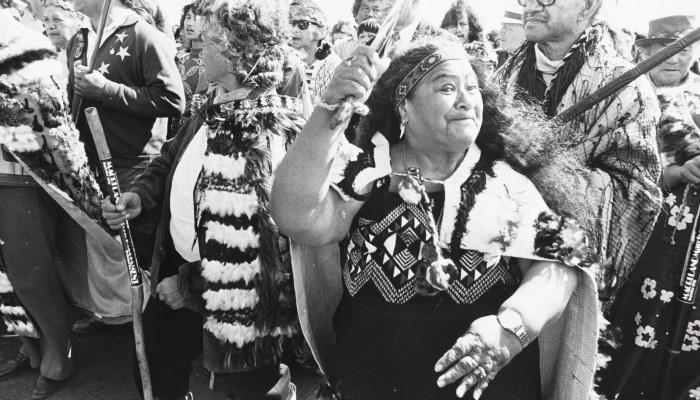
Mana in Māori society
This entry has websites to help you understand the different meanings of mana and its importance in political, social and traditional relationships in Māori society.
Learn about mana in Māori society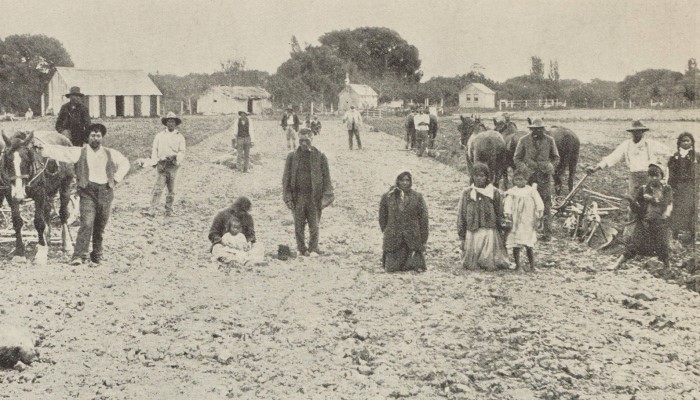
Māori economy: opportunities and challenges
This entry will help you find the best websites and databases that explore the history and development of the Māori economy including the challenges Māori faced from the New Zealand Wars, land sales and decisions made by the Native Land Court.
Learn about māori economy: opportunities and challenges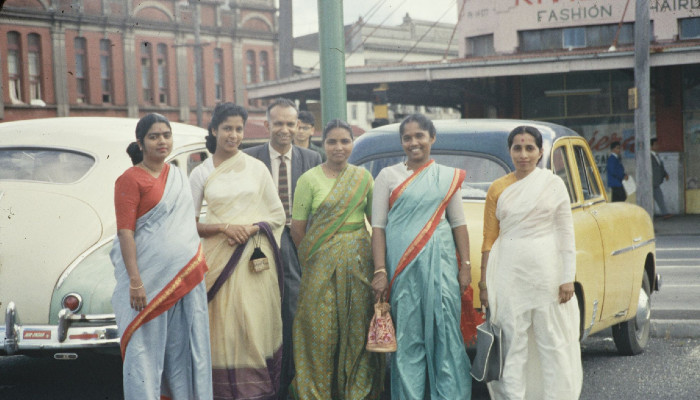
Peopling the colony: inclusion and exclusion
This entry recommends places to find information about the history of immigration to Tāmaki Makaurau and New Zealand. This includes immigration laws and changes, the role of Māori in immigration, and the government's attempt to set right past injustices.
Learn about peopling the colony: inclusion and exclusion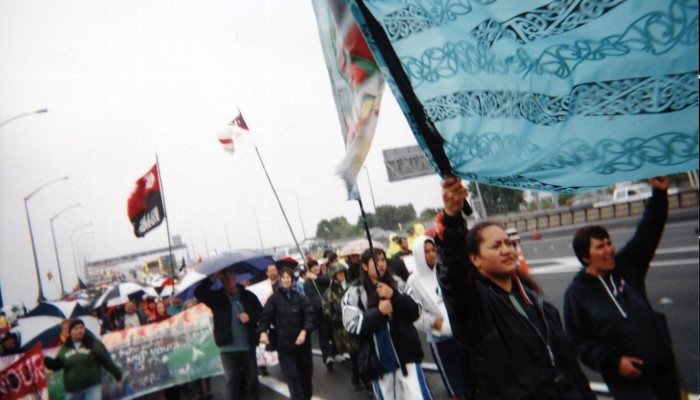
Sovereignty vs rangatiratanga: wars, laws and policies
This entry recommends websites where you can find information about the impacts of land laws on Māori, the New Zealand Wars, and attempts by Māori to find justice and build a relationship with the Crown.
Learn about sovereignty vs rangatiratanga: wars, laws and policies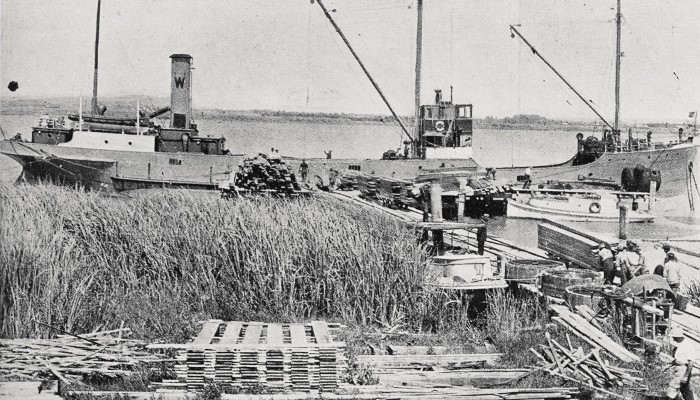
Technology and economic development
This entry will help you understand how advances in technology and land acquisition developed Auckland's economy but greatly impacted Māori and their economy.
Learn about technology and economic development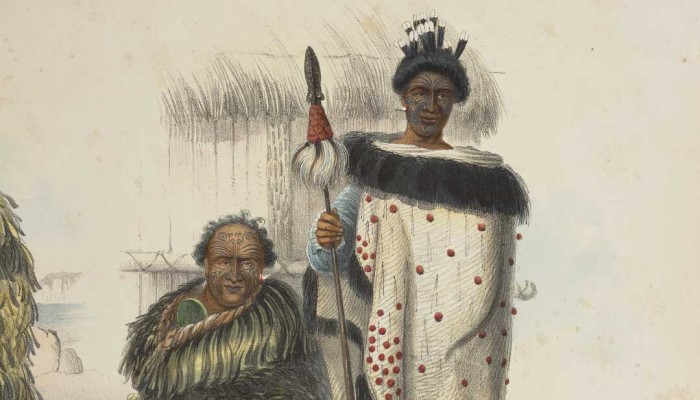
Te Tiriti o Waitangi
This entry recommends websites and collections to find information about He Whakaputanga o te Rangatiratanga o Nu Tireni | The Declaration of Independence and the Treaty of Waitangi | Te Tiriti o Waitangi, their significance, and the signatories.
Learn about te Tiriti o Waitangi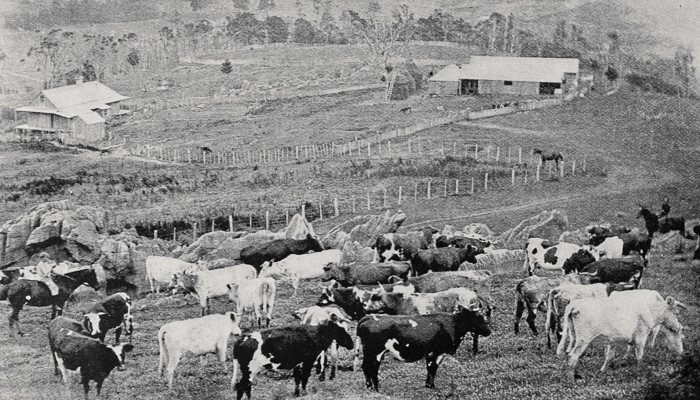
Transforming environments
This entry explores changes made by settlers to Aotearoa's natural environment, their naming of places and features, and efforts to conserve and restore its natural beauty.
Learn about transforming environments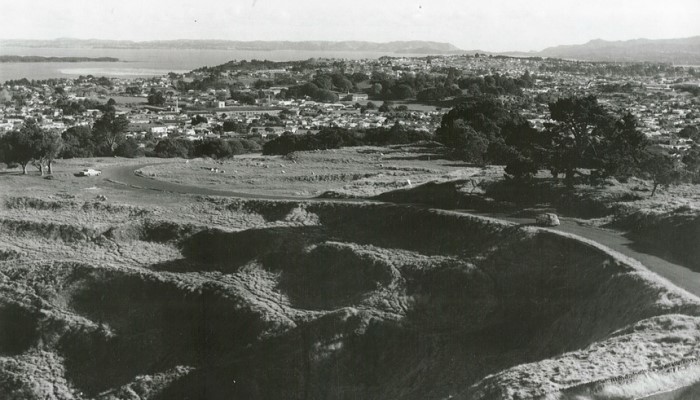
Transforming te taiao
This entry will help you find information on the changes made to the environment by pre-European Māori, and their care and connections to te taiao (the natural world).
Learn about transforming te taiao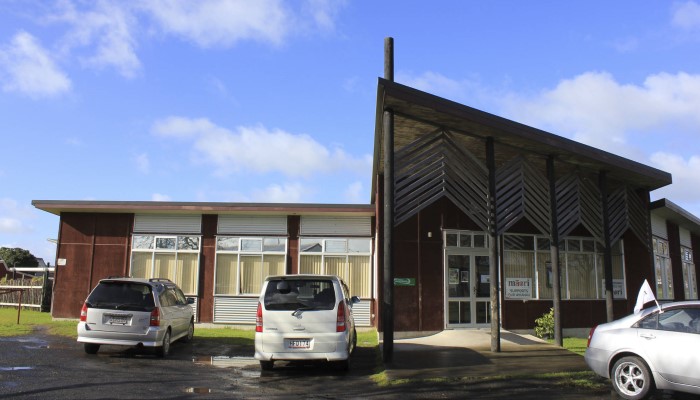
Urbanisation and being Māori
This entry will help you find information about Māori migration to cities, their challenges, and what this meant for their identity as Māori. You will also find information about some protests Māori were involved in to challenge political and social ideas.
Learn about urbanisation and being Māori
